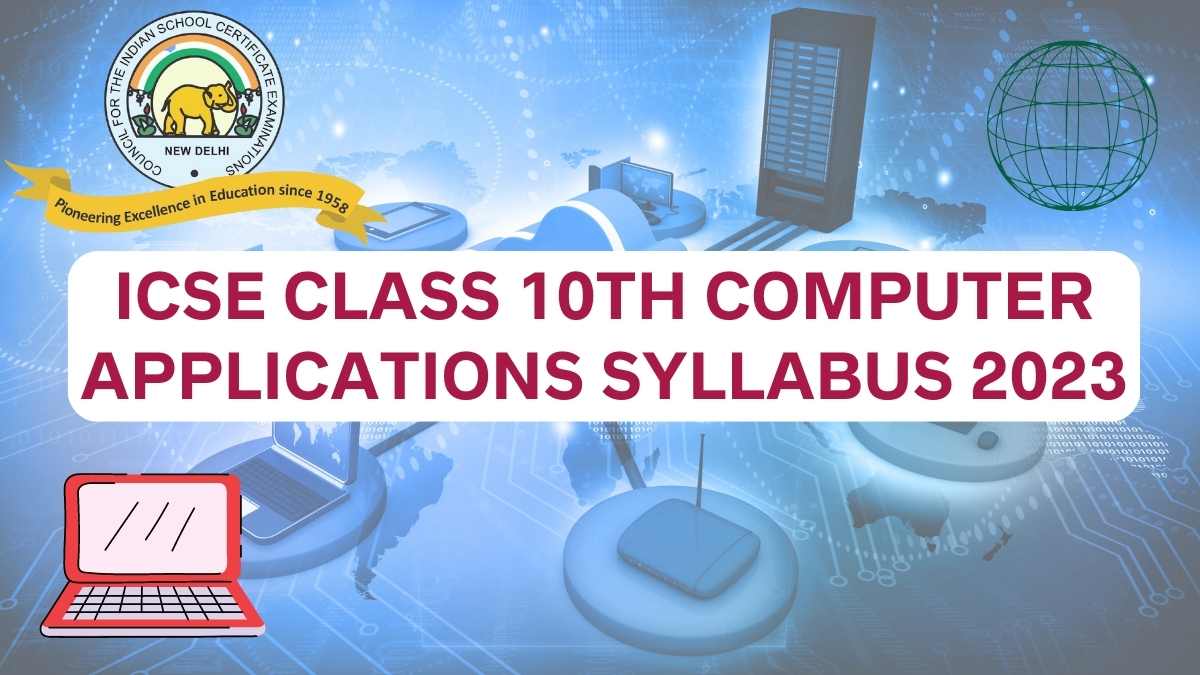ICSE Class 10th Computer Applications Syllabus 2023: Computer Applications is one of the most popular subjects in ICSE Class 10. Computer Applications falls in the Group III subjects of the ICSE Board curriculum and is highly preferred by students due to its importance in higher education. Computer Applications introduces OOPs, classes and other necessary programming concepts that lay the foundation for students to pursue careers in technology. The ICSE Class 10 Computer Applications (Code: 86) conducts a theory paper along with an equally important internal assessment to check students’ practical knowledge. We have covered the ICSE Class 10 Computer Applications syllabus of both theory and internal assessment. View and download the latest and revised ICSE Board Class 10 Computer Applications syllabus 2023 pdf here.
ICSE Board Class 10 Computer Applications Syllabus
The ICSE class 10 Computer Applications will have one paper of two hours, carrying 100 marks along with an internal assessment of 100 marks. The written paper will be divided into two sections. Section A (Compulsory) of 40 marks will consist of short answer questions while Section B of 60 marks will consist descriptive type questions.
THEORY – 100 Marks
- Revision of Class IX Syllabus
(i) Introduction to Object Oriented Programming concepts, (ii) Elementary Concept of Objects and Classes, (iii) Values and Data types, (iv) Operators in Java, (v) Input in Java, (vi) Mathematical Library Methods, (vii) Conditional constructs in Java, (viii) Iterative constructs in Java.
- Class as the Basis of all Computation
Objects and Classes
Objects encapsulate state and behaviour – numerous examples; member variables; attributes or features. Variables define state; member methods; Operations/methods/messages/ methods define behaviour.
Classes as abstractions for sets of objects; class as an object factory; primitive data types, composite data types. Variable declarations for both types; difference between the two types. Objects as instances of a class.
Consider real life examples for explaining the concept of class and object.
- User – defined Methods
Need of methods, syntax of methods, forms of methods, method definition, method calling, method overloading, declaration of methods,
Ways to define a method, ways to invoke the methods – call by value [with programs] and call by reference [only definition with an example], Object creation – invoking the methods with respect to use of multiple methods with different names to implement modular programming, using data members and member methods, Actual parameters and formal parameters, Declaration of methods – static and non-static, method prototype / signature, – Pure and impure methods, – pass by value [with programs] and pass by reference [only definition with an example], Returning values from the methods , use of multiple methods and more than one method with the same name (polymorphism – method overloading).
- Constructors
Definition of Constructor, characteristics, types of constructors, use of constructors, constructor overloading.
Default constructor, parameterized constructor, constructor overloading., Difference between constructor and method.
- Library classes
Introduction to wrapper classes, methods of wrapper class and their usage with respect to numeric and character data types. Autoboxing and Unboxing in wrapper classes.
Class as a composite type, distinction between primitive data type and composite data type or class types. Class may be considered as a new data type created by the user, that has its own functionality. The distinction between primitive and composite types should be discussed through examples. Show how classes allow user defined types in programs. All primitive types have corresponding class wrappers. Introduce Autoboxing and Unboxing with their definition and simple examples.
The following methods are to be covered:
int parseInt(String s),
long parseLong(String s),
float parseFloat(String s),
double parseDouble(String s),
boolean isDigit(char ch),
boolean isLetter(char ch),
boolean isLetterOrDigit(char ch),
boolean isLowerCase(char ch),
boolean isUpperCase(char ch),
boolean isWhitespace(char ch),
char toLowerCase (char ch)
char toUpperCase(char ch)
- Encapsulation
Access modifiers and its scope and visibility.
Access modifiers – private, protected and public. Visibility rules for private, protected and public access modifiers. Scope of variables, class variables, instance variables, argument variables, local variables.
- Arrays
Definition of an array, types of arrays, declaration, initialization and accepting data of single dimensional array, accessing the elements of single dimensional array.
Arrays and their uses, Search techniques – linear search and binary search, Array as a composite type, length statement to find the size of the array (searching techniques using single dimensional array only).
- String handling
String class, methods of String class, implementation of String class methods, String array
The following String class methods are to be covered:
String trim ()
String toLowerCase()
String toUpperCase()
int length( )
char charAt (int n)
int indexOf(char ch)
int lastIndexOf(char ch)
String concat(String str)
boolean equals (String str)
boolean equalsIgnoreCase(String str)
int compareTo(String str)
int compareToIgnoreCase(String str)
String replace (char oldChar,char newChar)
String substring (int beginIndex)
String substring (int beginIndex, int endIndex)
boolean startsWith(String str)
boolean endsWith(String str)
String valueOf(all types)
Programs based on the above methods, extracting and modifying characters of a string, searching for a string using linear search technique.
Download and read the ICSE Class 10th Computer Applications Syllabus 2022-23 below
The ICSE class 12 board exams are fast approaching and the datesheet has also been released. Now is the time to start attempting mock tests. It boosts confidence and gives students an idea of what and what not to do in the final exams. Check the ICSE Class 10 mock tests here.
